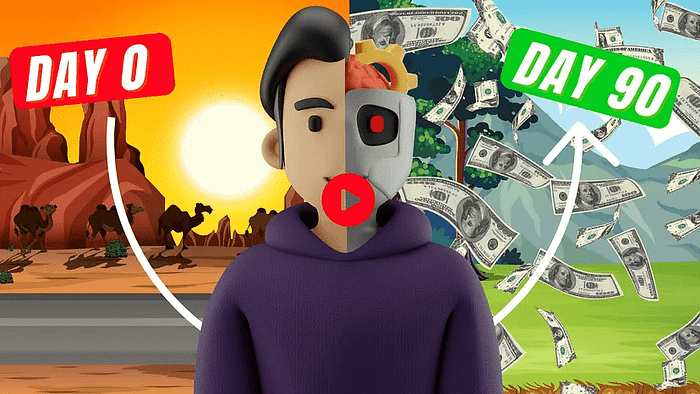Turn Your Knowledge Into A Business: Unlocking Your Mind’s Potential
Have you ever wondered how to turn your knowledge into a business? It’s a question that has plagued many aspiring entrepreneurs, and for good reason. The ability to monetize your expertise can be the key to financial freedom and personal fulfillment.
When I was younger, I made a crucial observation that would shape my entire approach to work and success. I realized that to truly thrive, I needed to earn with my mind, not just my time. This distinction between labor workers and creative workers became the foundation of my journey to turn my knowledge into a business.
Labor workers, I noticed, often tried to accomplish as much as their bodies could handle within the time they had available. They were locked into salaries and schedules that paid them a set amount for their efforts, regardless of the results they produced. On the other hand, creative workers focused on solving problems that led to the most significant outcomes, creating their own salaries and schedules based on the level of problems they solved.
Now, don’t get me wrong – there’s nothing inherently wrong with labor work. Many professions, like doctors and engineers, can command impressive salaries through this model. However, it’s essential to understand that when you engage in labor work, you’re trading time for money, and your time is fundamentally limited.
Consider a doctor, for instance. They might be paid the same amount whether they save a life or simply prescribe aspirin. In contrast, a creative worker like a writer can potentially earn as much as they want, depending on what they write, the product they create, and how far their writing spreads.
The main difference between labor workers and creative workers lies in owning a business. Business is about solving creative problems and developing valuable products that can sell at any time. As soon as you stop solving creative problems around product development and reach, your income stagnates, and you become a slave to the work you’ve built for yourself.
To turn your knowledge into a business, you need to embrace this mindset shift. Those who successfully monetize their minds enjoy a level of luxury that’s unfathomable to those who only monetize their time. It’s about creating systems and products that work for you, even when you’re not actively working.
When I first started in business, like many others, I began with freelancing. It seemed beginner-friendly and cost nothing to start. However, as my responsibilities increased and I could only take on a specific number of clients, I realized I had inadvertently created a self-made 9-to-5 job for myself. The joy I initially felt in building the business slowly declined.
This realization led me to understand that creativity is dependent on the expansion of your mind. Personal growth equals business growth because expanding yourself and your mind allows for the expansion of your business potential. To solve the problems I faced, I had to explore new business opportunities that I might not have even considered possible before.
For freelancers out there looking to turn your knowledge into a business, here’s an early lesson: if you’re seeking more, you need to break out of the freelancer mindset. Educate yourself on new business models that you want to evolve into. This is the key to turning your knowledge into a business that can scale beyond your time limitations.
As I began writing online to attract new clients, I discovered the power of digital products that could sell while I slept. This removed my absolute dependence on client work to survive. I pivoted my freelance offer into a consulting offer, which allowed me to cut my client work time in half while charging more and doing less because I was helping someone rather than doing the work for them.
During this process, I made a life-changing discovery: if I could gain one reader, I could potentially gain a million. If I could gain one buyer, I could gain thousands. This realization held true as I scaled my business, and it’s a principle you can apply when you turn your knowledge into a business.
To truly turn your knowledge into a business, you need to understand the macronutrients of business: brand, content, product, and promotions.
We strongly recommend that you check out our guide on how to take advantage of AI in today’s passive income economy.
Table of Contents
Let’s break these down:
1. Brand: Your Online Identity
Your brand is essentially your online character or identity. It’s the front end of your business, what you display online to attract the right people and illustrate your digital identity. When you turn your knowledge into a business, your job is to attract the people you can help the most – those who share the same goals and problems as your past or present self but don’t have the skill to achieve or overcome them.
On your website, landing page, or social media profiles, your brand should imply:
- A meaningful goal you help people achieve
- A burning problem you can help them solve
- The interests or skills you teach to bridge the gap between problem and goal
This creates your digital reality, the frame through which you and your customers perceive information. Remember, your brand is built over time as people learn more about you through your content and products.
2. Content: Your Mindset and Skillset
When you turn your knowledge into a business, content becomes a necessity. It’s not just about marketing; it’s about sharing your mindset and skillset with your audience. Good content occurs when you attempt to inject your mindset and skillset into your readers over the course of 6 to 12 months, not just in one post.
Content is powerful for several reasons:
- It enhances your thinking, making your ideas clearer over time
- It’s often free to produce and can grow your audience organically
- It allows you to create customers over time, unlike ads
- It helps you validate and test ideas quickly
When creating content to turn your knowledge into a business, consider these questions:
- What are 5-10 beliefs that are seen as extreme or crazy to others but normal to you?
- What are 5-10 interests or skills that help you create the lifestyle you live and help your followers achieve?
- Why are those interests or skills important? What do they help people avoid or gain in life?
- What foundational knowledge do people need to understand about those skills or interests?
Remember to write so that a fifth-grader could understand you. This doesn’t mean watering down your content, but making it accessible to a broader audience.
3. Product: How You Achieved a Meaningful Goal
When you turn your knowledge into a business, your product is essentially how you achieved a meaningful goal. People follow you because they want to achieve the lifestyle you have or develop the mindset or skillset that allowed you to achieve that lifestyle.
To create a product that turns your knowledge into a business, ask yourself:
- What is the most meaningful goal you’ve achieved in your life up until now?
- What steps do people need to take to get there?
- What do people need to learn to take those steps?
- What can people practice and implement in their day to get results?
Your product should offer convenience, clarity, and a replicable system that gets results. It’s the difference between your free content and what people pay for – a structured, step-by-step approach to achieving the desired outcome.
4. Promotions: Why You Achieved the Goal
When you turn your knowledge into a business, your promotions are about communicating why you achieved your goal and why it matters to your audience. People don’t care about features; they care about benefits and transformations.
Your promotions should focus on:
- A burning problem your audience faces
- A desirable outcome they want to achieve
- A clear solution (your product) that bridges the gap
Whether you’re writing short-form social media posts or long-form sales pages, these three components should guide your promotional efforts.
Now that we’ve covered the macronutrients of business let’s dive deeper into how you can turn your knowledge into a business by productizing your mind.
Turning Your Knowledge Into A Business: The Mental Shift
To successfully turn your knowledge into a business, you need to make a fundamental mental shift. It’s not just about what you know; it’s about how you package and present that knowledge to create value for others.
Think of your mind as a mental body that you can build and shape, much like you would in bodybuilding. You digest information like you digest food, and you acquire skills like you build muscle. This mental esthetics approach is crucial when you turn your knowledge into a business.
When you turn your knowledge into a business, you’re not just selling information – you’re selling transformation. You’re helping people bridge the gap between where they are and where they want to be. This requires a deep understanding of human psychology and the ability to communicate complex ideas in simple, actionable terms.
The Power of Perspective in Turning Your Knowledge Into A Business
Your perspective shapes the entirety of your brand when you turn your knowledge into a business. It’s composed of your goals, the problems you’ve overcome, and the skills you’ve developed to achieve those goals. It also includes your beliefs, knowledge, and experiences that either limit or aid in your achievements.
When you turn your knowledge into a business, you’re essentially leading people towards a goal. You’re helping them with skillset and mindset through your content, and you’re giving them a system or clarity to achieve the goal through your product.
This is why it’s crucial to understand and articulate your unique perspective when you turn your knowledge into a business. It’s what sets you apart from others in your field and attracts the right audience to your brand.
The Art of Content Creation When You Turn Your Knowledge Into A Business
Content is the lifeblood of any business that monetizes knowledge. When you turn your knowledge into a business, your content becomes the primary way you attract, engage, and nurture your audience.
Here are some key principles to keep in mind when creating content to turn your knowledge into a business:
- Focus on education over promotion. Spend 80% of your time educating your audience and only 20% promoting your products.
- Use high-performing structures and frameworks. Until you develop your own unique style, don’t be afraid to use proven content structures as training wheels.
- Research and use high-performing angles. Position your ideas in attention-grabbing ways that entertain, educate, or inspire.
- Think long-term. Good content occurs when you attempt to inject your mindset and skillset into your readers over an extended period, not just in one post.
- Be authentic. Share your unique beliefs and experiences. This is what will set you apart when you turn your knowledge into a business.
Developing Your Product to Turn Your Knowledge Into A Business
When you turn your knowledge into a business, your product is the culmination of your expertise, packaged in a way that provides maximum value to your audience. Here’s how to approach product development:
- Identify your most meaningful achievement. What goal have you accomplished that others would want to emulate?
- Break down the steps. What process did you follow to achieve this goal?
- Identify the key learnings. What knowledge was crucial in taking these steps?
- Create a daily practice. What can people do every day to move towards this goal?
- Package it uniquely. Give your system or process a compelling name that catches attention.
Remember, when you turn your knowledge into a business, your product should solve a burning problem within the eternal markets of health, wealth, relationships, or happiness.
The Art of Promotion When You Turn Your Knowledge Into A Business
Promotion is where many people falter when trying to turn your knowledge into a business. It’s not about being salesy; it’s about effectively communicating the value you offer. Here’s how to approach promotions:
- Focus on transformation. People don’t buy features; they buy the promise of change.
- Tell stories. Use your own transformation story or the stories of your successful clients to illustrate the power of your product.
- Address objections. Anticipate and address the reasons why someone might hesitate to buy your product.
- Create urgency. Give people a reason to act now rather than later.
- Provide social proof. Use testimonials and case studies to build trust and credibility.
When you turn your knowledge into a business, your promotions should always tie back to the burning problem you solve, the desirable outcome you offer, and the clear solution you provide.
Overcoming Challenges When You Turn Your Knowledge Into A Business
Turning your knowledge into a business isn’t without its challenges. Here are some common hurdles you might face and how to overcome them:
- Imposter syndrome. Remember, you don’t need to be the world’s foremost expert to help people. You just need to be a few steps ahead of your audience.
- Information overload. Focus on creating a clear, step-by-step system rather than dumping all your knowledge at once.
- Pricing struggles. Don’t undervalue your expertise. Price based on the transformation you offer, not the time it takes you to deliver it.
- Technology overwhelm. Start simple. You don’t need complex systems to turn your knowledge into a business. A basic website and email list can get you started.
- Inconsistency. Treat your business like a job. Set regular hours for content creation, product development, and promotion.
The Future of Turning Your Knowledge Into A Business
As we look to the future, the opportunities to turn your knowledge into a business are only expanding. With advancements in technology and changes in work culture, more people than ever are seeking online education and transformation.
When you turn your knowledge into a business, you’re not just creating a source of income for yourself. You’re contributing to a global shift in how we learn, grow, and achieve our goals. You’re empowering people to overcome their challenges and reach their full potential.
Remember, when you turn your knowledge into a business, you’re not just selling a product or service. You’re selling a piece of yourself – your unique perspective, experiences, and insights. This is what will set you apart in an increasingly crowded marketplace.
In conclusion, turning your knowledge into a business is a journey of self-discovery, creativity, and impact. It requires a shift in mindset, a commitment to continuous learning and growth, and the courage to share your unique gifts with the world.
As you embark on this journey to turn your knowledge into a business, remember that every expert was once a beginner. Every successful knowledge business started with a single piece of content, a single product, a single sale. The key is to start, to put your knowledge out there, and to continuously refine and improve your offerings based on feedback and results.
So, are you ready to turn your knowledge into a business? Are you ready to productize your mind and create a lasting impact? The world is waiting for your unique insights and expertise. It’s time to take that first step and turn your knowledge into a thriving, fulfilling business.

We strongly recommend that you check out our guide on how to take advantage of AI in today’s passive income economy.




